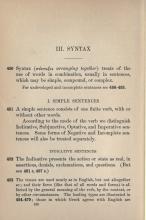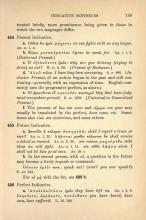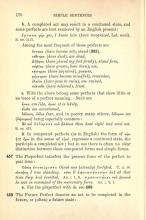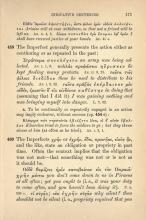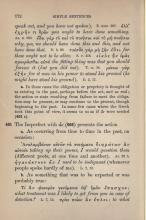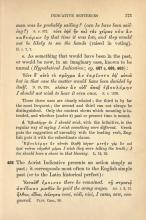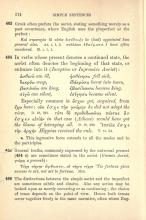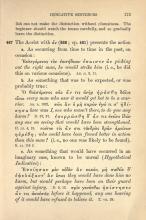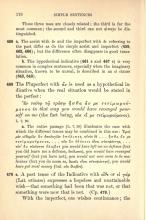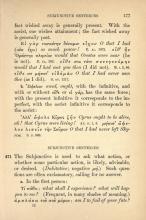452. The Indicative presents the action or state as real, in assertions, denials, exclamations, and questions. (But see §§ 461.c and 467.c, below.)
453. The tenses are used nearly as in English, but not altogether so; and their force (like that of all words and forms) is affected by the general meaning of the verb, by the context, or by other circumstances. The leading types are illustrated in §§ 454 - 470 (below); those in which Greek agrees with English are treated briefly, more prominence being given to those in which the two languages differ.
a. Οὐδεὶς ἔτι ἡμῖν μάχεται.
No one fights with us any longer.
Xen. Anabasis 2.1.4
b. Κῦρον μεταπέμπεται.
Cyrus he sends for.
Xen. Anabasis 1.1.2
(Historical Present)
c. Τί ἐξελαύνετε ἡμᾶς;
Why are you driving (trying to drive) us out?
Xen. Hellenica 2.4.20
(Present of Endeavor)
d. Ἀλγῶ πάλαι.
I have long been sorrowing.
Soph. Philoctetes 806
(Inclusive present, of an action begun in the past and still
continuing; generally with expression time.)[fn]English commonly uses progressive perfect as above.[/fn]
e. Οἱ φρονοῦντες εὖ κρατοῦσι πανταχοῦ.
They that have judgment everywhere prevail.
Soph. Ajax 1252
(Universal or Generalized Present)
f. The present of ἥκω (am come) and οἴχομαι (am gone) may usually be translated by the perfect (have come, etc.). Sometimes also νῑκῶ (am victorious), and some others.
a. Σπονδᾱ̀ς ἢ πόλεμον ἀπαγγελῶ;
Shall I report a truce or war?
Xen. Anabasis 2.1.23
λήψεται μισθὸν τάλαντον.
He shall receive a talent as reward.
Xen. Anabasis 2.2.20
σὺν τούτοις μαχούμεθα.
With these we will fight.
Xen. Anabasis 2.1.12
οὐκ εὐθὺς ἀφήσω αὐτόν.
I shall not let him go at once.
Plato Apology 29e
b. In the second person, with οὐ, a question in the future may become a lively request or command.
Οὔκουν ἐρεῖς ποτε;
Speak out (won't you ever speak?)
Soph. Antigone 244
For οὐ μή with the future see § 489.b.
a. Ἀπολελοίπᾱσιν ἡμᾶς.
They have left us.
Xen. Anabasis 1.4.8
ἀκηκόατε, ἑωρᾱ́κατε, πεπόνθατε.
You have heard, have seen, have suffered.
Lysias 12.100
b. A completed act may result in a continued state, and some perfects are best rendered by an English present.
ἔγνωκα γάρ.
Yes, I know him (have recognized, Latin novi).
Soph. Oedipus the King 1117
Among the most frequent of these perfects are
ἕστηκα
(have become set), stand (§ 363)
τέθνηκα
(have died), am dead
βέβηκα
(have placed my feet firmly), stand firm
πέφῡκα
(have grown, been bοrn), am
κέκτημαι
(have acquired), possess
μέμνημαι
(have become mindful), remember
ὄλωλα
(have gone to ruin), am ruined
πέποιθα
(have believed), trust
c. With the above belong some perfects that show little or no trace of a perfect meaning. Such are:
ἔοικα
am like, ἔοικε it is likely
εἴωθα
am accustomed
δέδοικα, δέδια
fear
and in poetry many others, δέδορκα (see, δέρκομαι) being especially common.
Σὺ καὶ δέδορκας κοὐ βλέπεις.
Thou hast sight and seest not.
Soph. Oedipus the King 413
d. In compound perfects (as in English) the form of εἰμι (or ἔχω in the sense of εἰμι) expresses a continued state, the participle a cσmpleted act; but in use there is often no clear distinction between these compound forms and simple forms.
457. The Pluperfect transfers the present force of the perfect to past time.
Oἰνόη ἐτετείχιστο.
Oinoë was (already) fortifed.
Thucydides 2.18
εἱστήκη.
I was standing.
τότε δ᾿ ἀφειστήκεσαν.
But at that time they had revolted.
Xen. Anabasis 1.1.6
προειστήκει τοῦ ξενικοῦ.
He was in command of the mercenary force.
Xen. Anabasis 1.2.1
a. For the pluperfect with ἄν see § 469 (below).
458. The Future Perfect denotes an act to be completed in the future, or (often) a future state.
Εὐθὺς Ἀριαῖος ἀφεστήξει, ὥστε φίλος ἡμῖν οὐδεὶς λελείψεται.
Ariaios will at once withdraw, so that not a friend will be left us.
Xen. Anabasis 2.4.5
δίκαια πεπονθὼς ἐγὼ ἔσομαι ὑφʼ ῡ̔μῶν.
I shall have received justice at your hands.
Plato Apology 41e
459. The Imperfect generally presents the action either as continuing or as repeated in the past.
Στράτευμα συνελέγετο.
An army was being collected.
Xen. Anabasis 1.1.9
πολλᾱ̀ς προφάσεις ηὕρισκεν.
He kept finding many pretexts.
Xen. Anabasis 2.3.21
ταῦτα τοῖς φίλοις διεδίδου.
These he used to distribute to his friends.
Xen. Anabasis 1.9.22
ταῦτα πρᾱ́ξᾱς ἐκέρδαινον μὲν οὐδὲν, ἐμαυτὸν δʼ εἰς κίνδῡνον καθῑ́στην.
In doing that (assuming that I did it) I was gaining nothing and was bringing myself into danger.
Lysias 7.32
a. To be continually or repeatedly engaged in an action may imply endeavor, without success (cp. § 454.c, above).
Κλέαρχος τοὺς στρατιώτᾱς ἐβιάζετο ἰέναι, οἱ δʼ αὐτὸν ἔβαλλον.
Klearchos tried to force the soldiers to go; but they threw stones at him (as often as he tried).
Xen. Anabasis 1.3.1
460. The Imperfects χρῆν or ἐχρῆν, ἔδει, προσῆκε, εἰκὸς ἦν, and the like, state an obligation or propriety in past time. Often the context implies that the obligation was not met— that something was not or is not as it should be.
Οὐδὲ θαμίζεις ἡμῖν καταβαίνων εἰς τὸν Πειραιᾶ· χρῆν μέντοι.
You don't come down to us in Piraeus at all often; yet you ought to (i.e., it was your duty to come often, and you haven't been doing it).
Plato Republic 328c
τί σῑγᾷς; οὐκ ἐχρῆν σῑγᾶν.
Why silent? Thou shouldst not be silent (i.e, propriety required that you speak out, and you have not spoken).
Eur. Hippolytus 297
ἀλλʼ ἐχρῆν τι δρᾶν.
You ought to have done something.
Aristoph. Frogs 568
ἔδει γὰρ τὸ καὶ τὸ ποιῆσαι καὶ τὸ μὴ ποιῆσαι.
Why, yes, we should have done this and this, and not have done that.
Demosthenes 9.68
τούσδε γὰρ μὴ ζῆν ἔδει.
For these ought not to be alive.
Soph. Philoctetes 418
εἰκὸς ἦν ῡ̔μᾶς προορᾶσθαι αὐτά.
The fitting thing was that you should foresee it (but you did not).
Thucydides 6.78
μένειν γὰρ ἐξῆν.
For it was in his power to stand his ground (he might have stood his ground).
Demosthenes 3.17
a. In these cases the obligation or propriety is thought of as existing in the past, perhaps before the act, and as real; the action or state resulting from failure to meet the obligation may be present, or may continue to the present, though beginning in the past. In some few cases where the Greek took this point of view, it seems to us as if ἄν were needed (§ 461.c, below).
461. The Imperfect with ἄν (§ 666) presents the action:
a. As occurring from time to time in the past, on occasion.
Ἀναλαμβάνων αὐτῶν τὰ ποιήματα διηρώτων ἂν αὐτούς.
Taking up their poems, I would question them (different poets, at one time and another).
Plato Apology 22b
ἠγανάκτουν ἄν.
I used to be indignant (whenever people spoke hardly of me).
Lysias 7.12
b. As something that was to be expected or was probably true.
Τί ἂν φανερὸς γενόμενος ὑφʼ ῡ̔μῶν ἔπασχον;
What treatment was I likely to get from you in case of detection?
Lysias 7.12
πρὸς ποῖον ἂν ἔπλει;
To what man was he probably sailing? (can he have been sailing?)
Soph. Philoctetes 572
τότε ὀψὲ ἦν καὶ τᾱ̀ς χεῖρας οὐκ ἂν καθεώρων.
By that time it was late, and they would not be likely to see the hands (raised in voting).
Xen. Hellenica 1.7.7
c. As something that would have been in the past, or would be now, in an imaginary case, known to be unreal (Hypothtical Indicative; cp. §§ 467.c, 468, and 469, below).
Τότε δʼ αὐτὸ τὸ πρᾶγμα ἂν ἐκρῑ́νετο ἐφʼ αὑτοῦ.
But in that case the matter would have been decided by itself.
Demosthenes 18.224
κλύειν ἂν οὐδʼ ἅπαξ ἐβουλόμην.
I should not wish to hear it even once.
Soph. Philoctetes 1239
These three uses are closely related; the third is by far the most frequent; the second and third can not always be distinguished. Only the context shows which meaning is intended, and whether (under c) past or present time is meant.
d. Ἐβουλόμην ἄν (I should wish), with the infinitive, is the regular way of saying I wish something were different. Greek puts the suggestion of unreality with the leading verb, English puts it with the subordinate clause.
Ἐβουλόμην ἂν αὐτοὺς ἀληθῆ λέγειν· μετῆν γὰρ ἂν καὶ ἐμοὶ τούτου τᾱ̓γαθοῦ μέρος.
I wish they were telling the truth; I too should have a share in that blessing.
Lysias 12.22
462. The Aorist Indicative presents an action simply as past; it corresponds most often to the English simple past (or to the Latin historical perfect).
Ἐνταῦθʼ ἔμεινεν.
There he remained.
τῇ στρατιᾷ ἀπέδωκε μισθόν.
He paid the army wages.
Xen. Anabasis 1.2.12
ἦλθον, εἶδον, ἐνῑ́κησα. (Latin veni, vidi, vici.)
I came, saw, conquered.
Plut. Caesar 50.2
463. Greek often prefers the aorist, stating something merely as a past occurrence, where English uses the pluperfect or the perfect.
Καὶ στρατηγὸν δὲ αὐτὸν ἀπέδειξε.
He (had) appointed him general also.
Xen. Anabasis 1.1.2
πολλάκις ἐθαύμασα.
I have often wondered.
Xen. Memorabilia 1.1.1
464. In verbs whose present denotes a continued state, the aorist often denotes the beginning of that state, or entrance into it (Inceptive or lngressive Aorist).
| Present | Aorist |
| ἀσθενῶ am ill |
ἠσθένησα fell sick |
| δακρῡ́ω weep |
ἐδάκρῡσα burst into tears |
| βασιλεύω am king |
ἐβασίλευσα became king |
| σῑγῶ am silent |
ἐσῑ́γησα became silent |
Especially common is ἔσχον (got, acquired,) from ἔχω (have).
οὐκ ἔσχε τὴν γνώμην.
He did not adopt the view.
Demosthenes 18.291
τότε δὲ προδεδωκέναι πάντας ἂν ἔσχεν αἰτίᾱν.
In that case (Athens) would have got the blame of betraying all.
Demosthenes 18.200
Ἱππίᾱς ἔσχε τὴν ἀρχήν.
Hippias received the rule.
Thucydides 6.54.2
a. This ingressive force extends to all the modes and to the participles.
465. General truths, commonly expressed by the universal present (§ 454.e, above) are sometimes stated in the aorist (Gnomic Aorist, γνώμη a proverb).
Tύχη τέχνην ὤρθωσεν, οὐ τέχνη τύχην.
'Tis fortune gives success to art, not art to fortune.
Menander FCG 495
466. The distinctions between the simple aorist and the imperfect are sometimes subtle and elusive. Also any action may be looked upon as merely occurring or as continuing; the choice of tense depends on the point of view. Hence both tenses occur together freely in the same narrative, often where English can not make the distinction without clumsiness. The beginner should watch the tenses carefully, and so gradually learn the distinction.
467. The Aorist with ἄν (§ 666; cp. § 461, above) presents the action:
a. As occurring from time to time in the past, on occasion.
Ἐκλεγόμενος τὸν ἐπιτήδειον ἔπαισεν ἄν.
Picking out the right man, he would strike him.
(i.e., he did this on various occasions)
Xen. Anabasis 2.3.11
b. As something that was to be expected, or was probably true.
Ὁ θεᾱσάμενος πᾶς ἄν τις ἀνὴρ ἠράσθη δᾱ́ϊος εἶναι.
Every man who saw it would get hot to be a warrior.
Aristoph. Frogs 1022
πῶς ἂν ὁ μὴ παρὼν ἐγώ τι σʼ ἠδίκησα;
How was I, one who wasn't there, to do you any harm?
Demosthenes 37.57
ἐπερρώσθη δʼ ἄν τις ἐκεῖνο ἰδών.
Any one on seeing that would have been strengthened.
Xen. Hellenica 3.4.18
τούτου τίς ἄν σοι τᾱ̓νδρὸς δρᾶν ἀμείνων ηὑρέθη;
Who could have been found better in action than this man?
(i.e., no one was likely to be found).
Soph. Ajax 119–120
c. As something that would have occurred in an imaginary case, known to be unreal (Hypothetical Indicative).
Ἐποίησαν μὲν οὐδὲν ἂν κακόν, μὴ παθεῖν δʼ ἐφυλάξαντʼ ἂν ἴσως.
They would have done him no harm, but would perhaps have been on their guard against injury.
Demosthenes 9.13
πρὶν γενέσθαι ἠπίστησεν ἄν τις ἀκούσᾱς.
Before it happened, any one hearing of it would have refused to believe it.
Thucydides 7.28.3
These three uses are closely related; the third is far the most common; the second and third can not always be distinguished.
468. a. The aorist with ἄν and the imperfect with ἄν referring to the past differ as do the simple aorist and imperfect (§§ 459, 462, and 466, above); but the difference often disappears in good translation.
b. The hypothetical indicative (§§ 461.c and 467.c, above) is very common in complex sentences, especially when the imaginary situation, known to be unreal, is described in an εἰ clause (§§ 645, 649).
469. The Pluperfect with ἄν is used as a hypothetical indicative when the real situation would be stated in the perfect.
Ἐν τούτῳ τῷ τρόπῳ ἦσθα ἄν με τετῑμωρούμενος.
In that way you would have revenged yourself on me.
(the fact being, οὐκ εἶ με τετῑμωρούμενος)
Lysias 7.20
a. The entire passage (Lysias 7.20) illustrates the ease with which the different tenses may be combined in this use.
Ἐμοὶ μὲν οὐδεμίᾱν ἂν ἀπολογίᾱν ὑπέλιπες, αὐτὸς δὲ . . . ἦσθα ἄν με τετῑμωρούμενος, . . . οὐκ ἂν ἐδόκεις εἶναι σῡκοφάντης, . . .τότʼ ἂν πλεῖστον ἔλαβες
You would have left me no defense (but you did leave me a defense, ὑπέλιπες), you would have revenged yourself (but you have not), you would not now seem to be malicious (but you do seem so, δοκεῖς εἶναι σῦκοφάντης), you would have got most money (but οὐκ ἔλαβες).
470. a. A past tense of the Indicative with εἴθε or εἰ γάρ (Latin utinam) expresses a hopeless and unattainable wish—that something had been that was not, or that something were now that is not. (Cp. § 476.) With the imperfect, one wishes continuance; the fact wished away is generally present. With the aorist, one wishes attainment; the fact wished away is generally past.
Εἰ γὰρ τοσαύτην δύναμιν εἶχον.
O that I had (οὐκ ἔχω) so much power!
Eur. Alcestis 1072
εἴθʼ ἦν Ὀρέστης πλησίον.
Would that Orestes were near (he is not).
Eur. Electra 282
εἴθε σοι τότε συνεγενόμην.
Would that I had met you then (I did not).
Xen. Memorabilia 1.2.46
εἴθε σε μήποτʼ εἰδόμᾱν.
O that I had never seen thee (as I did).
Soph. Oedipus the King 1217
b. Ὤφελον (owed, ought) with the infinitive, and with or without εἴθε or εἰ γάρ, has the same force; with the present infinitive it corresponds to the imperfect, with the aorist infinitive it corresponds to the aorist.
Ἀλλʼ ὤφελε Κῦρος ζῆν.
Cyrus ought to be alive, ah! that Cyrus were living!
Xen. Anabasis 2.1.4
μήποτʼ ὤφελον λιπεῖν τὴν Σκῦρον.
O that I had never left Skyros.
Soph. Philoctetes 969

